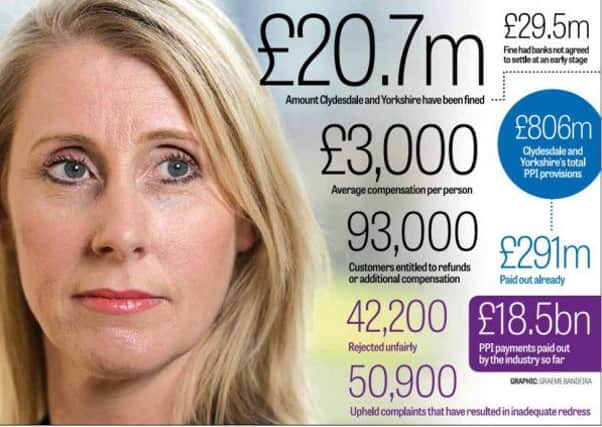Disgrace’: Yorkshire Bank customers in line for compensation after staff lied to watchdog


The Financial Conduct Authority said Yorkshire Bank and sister bank Clydesdale were guilty of “serious failings” in Payment Protection Insurance (PPI) complaint handling.
As a result more than 40,000 cases may have been rejected unfairly and over 50,000 may have been given inadequate compensation.
Advertisement
Hide AdAdvertisement
Hide AdYorkshire Bank customers will be contacted by their bank if they are liable for compensation.
Any customers who think they might have been mis-sold insurance on mortgages or loans but have not yet applied should contact their bank.
Yorkshire and Clydesdale have set aside £806m to reimburse customers in what has become one of the worst banking scandals in history, with the industry paying out £18.5bn so far to pay back customers.
Yorkshire Bank said it was “very sorry” for the mistakes that have been made and said it is very keen to put them right.
Advertisement
Hide AdAdvertisement
Hide AdBut Martin Lewis, founder and editor of MoneySavingExpert.com, called Yorkshire and Clydesdale’s behaviour “a disgrace”.
“I’m not convinced this is an isolated incident,” he added.
“The PPI battle is far from over. There are many billions of pounds still to be paid out to people who had their money wrongly taken off them often by lying or deceit.”
Yorkshire Bank said it was “very sorry” for the errors, but said no-one had lost their jobs over them although it is yet to complete its investigation. It said that “appropriate disciplinary action” has been taken.
The failings came to light when the Financial Conduct Authority (FCA) expressed concerns in 2013 about how Yorkshire and Clydesdale had handled PPI complaints.
Advertisement
Hide AdAdvertisement
Hide AdThe banks worked with the FCA to investigate the failings and it was found that they provided false information to the Financial Ombudsman Service in response to requests for evidence of the records Clydesdale held on PPI policies sold to customers.
The FCA said the banks also failed to take into account all relevant documents when deciding how to deal with complaints.
In two cases, staff even altered system print- outs to make it look like the banks held no relevant documents and deleted PPI information.
The FCA ruled that these practices were done without the knowledge or authorisation of the banks.
Advertisement
Hide AdAdvertisement
Hide AdYorkshire and Clydesdale’s acting chief executive Debbie Crosbie said: “We’re very sorry for what went wrong and we’re keen to put it right.
“We’ve completely overhauled all our policies and we can reassure customers this won’t happen again. Our monitoring and procedures would pick it up.”
The matters relate to complaint handling processes between May 2011 and July 2013.
Georgina Philippou, acting director of enforcement and market oversight at the FCA, said: “Clydesdale’s failings were unacceptable and fell well below the standard the FCA expects.
Advertisement
Hide AdAdvertisement
Hide Ad“The fact that Clydesdale misled the Financial Ombudsman by providing false information about the information it held is particularly serious and this is reflected in the size of the fine.”
Out of 126,600 PPI complaints decided between May 2011 and July 2013, up to 42,200 may have been rejected unfairly and up to 50,900 upheld complaints may have resulted in inadequate redress for customers.
The two banks are now reviewing all PPI complaints handled prior to last August.
Ms Crosbie said: “In 2011 we introduced changes to our policies and procedures that were designed to help us respond to PPI complaints. A number of these changes were inappropriate and have disadvantaged some of our customers. We got this wrong and I am sorry for that.”
Advertisement
Hide AdAdvertisement
Hide AdAsked whether the departure of former chief executive David Thorburn in February had anything to do with the PPI scandal, she said “categorically not”.
She was also adamant that the fine will have no impact on Yorkshire Bank chairman, Richard Gregory.
However, consumer groups acted angrily to the latest fine. Which? executive director, Richard Lloyd, said: “These failings add insult to injury for customers who have already been ripped off once. It’s been clear for years that banks should be doing more to resolve the mistakes they’ve made and this fine should be a warning shot for others who still aren’t treating customers fairly. The regulator must force banks to change their culture so that nothing like this ever happens again.”